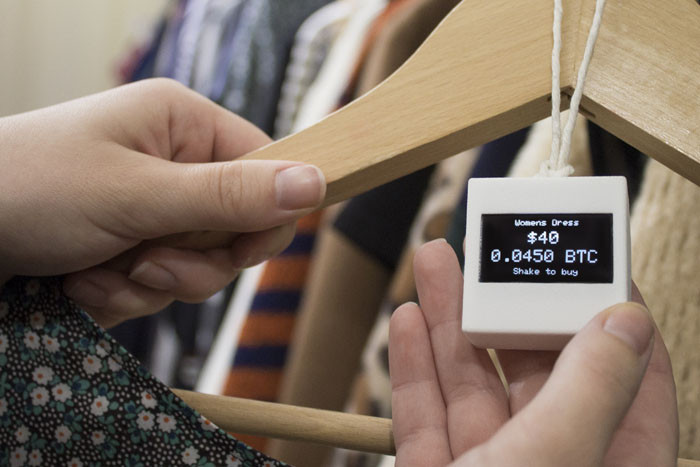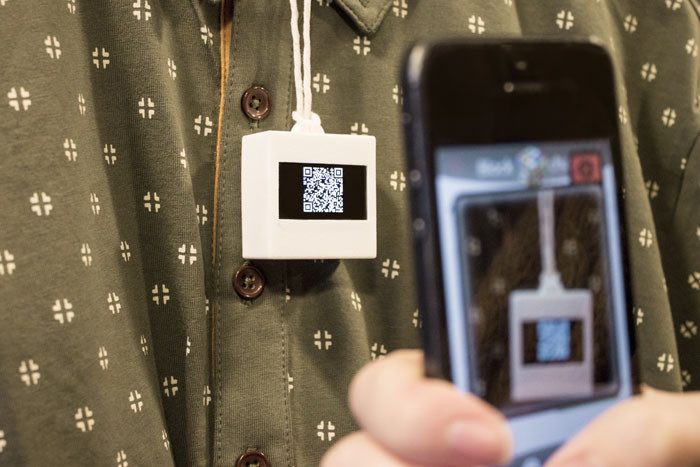BitTag: Bringing Bitcoin Retail into the Real World

Making bitcoin visible in the real world, away from the internet, is how the confusing and volatile cryptocurrency will become socially accepted, says Sam Cox, creator of the BitTag.
A 3D-printed price tag to be attached to clothing or other goods, BitTag was created by Cox as one of his monthly projects combining physical products with digital technologies. A prototype for now, BitTag could one day become reality if Cox can source funding from investors.
Speaking to IBTimes UK, Cox, 24, explained how he saw potential in bitcoin, but only if its benefits could be explained to the masses - and that meant bringing the technology into the real, physical world.
"I thought 'let's explore this space', let's go deeper and make something that takes it offline." Cox explains from the offices of creative technology company Rehab, in Old Street area of east London, also known as Tech City.
It's all about "the physical exploration" of bringing an intangible and often confusing virtual currency into the real world and making it accessible for all, he said.
Let's make it fast and see the reaction
Like any young Tech City entrepreneur, Cox knew time was of the essence - even more so, given bitcoin's notoriously volatile valuation and lack of legislation governing its use.
"My approach was this: let's make it fast, because bitcoin evolves all the time, so let's get something out there at a rapid rate and see the reaction. If people seem to pick it up and like it then let's review and move the goal posts further forward. That's where we are now - you build something really fast, make a prototype which works and you can show people, then you gauge reaction."
Cox designed the matchbox-sized price tag himself on a laptop, before sending the file to a 3D printing company which returned the finished product to his desk a few days later, complete with OLED screen and a Bluetooth connection to receive data from an iPad - running an app he also created himself.
One iPad can be used to control multiple BitTags, which display the most up-to-date price when shaken; a second shake reveals a QR code which can be scanned by the user's smartphone to transfer funds from their bitcoin wallet to that of the shop they're in, negating the need for a conventional till or checkout.

Due to its extremely low power demands, Cox says the BitTag can last several weeks on a single charge - and he is yet to give consideration to making the device power efficient, something he says could be improved with modifications. To date, the whole project has cost him just £150.
Uncertainty? That's the exciting bit
Asked if he was fearful of developing a product for bitcoin, with all its volatility and legal uncertainty, Cox remains defiant. "That's the exciting bit, right? If you had something which was standardised and a constant then it's not quite as exciting. If you're in an area that's so volatile and you're in an area which potentially makes a large impact down the line, then that's really exciting for me. I don't like doing something that's just 'oh, yeah, ok that's all right'.
Cox says he wants to create a product which "causes a stir, creates a reaction and helps things along", in terms of making bitcoin more socially acceptable.
Currency or technology?
As bitcoin's price continues to fluctuate even more quickly than most traditional investors are comfortable with, Cox is more interested in what cryptocurrencies can offer as a technology, rather than as a replacement for regular currencies. "It's more a case of what the technology is and what it stands for, how it's anonymous and decentralised as well.
"I think that's where it gets really interesting - but the key is how we communicate that and how we get the message out there for people to understand and reason with."

Looking to the future and to bitcoin's next five years, Cox sees it as "a technology to enable stuff...we'll see an influx of stores using this as a valid form of currency and I'm hoping we'll see it as a standard form of paying for something - but it will take change in society for that to happen".
While government officials, central banks and law enforcement agencies the world over continue to wrestle with what bitcoin is and how it should be controlled, Cox says the other half of this battle to make bitcoin mainstream will be fought by developers expanding on what the technology can do.
Give bitcoin to hackers, not the banks
"Let's get it into the hands of hackers - the good type of hackers - people who are going to want to make stuff for it. Let's get more people involved and push it forward," Cox enthuses.
HM Revenue and Customs is expected to change its stance on bitcoin later this month, classifying it as private money, but any further regulation or legislation could reduce it's value.
Cox said: "I fear that if you get banks in the fold it will just become another currency. It won't be different...as soon as you start putting [a traditional banking system] into the jigsaw puzzle I fear it will just melt away. I think the benefit of bitcoin is that it's almost independent."
© Copyright IBTimes 2024. All rights reserved.







